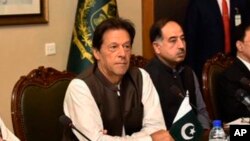Reactions are mixed over the Pakistan government's decision to withdraw the name of a prominent Western-educated economist from its recently established Economic Advisory Council (EAC) following pressure from several religious parties in the country.
Atif Mian, 43, a Princeton University professor who comes from Pakistan's Ahmadi religious community, was chosen to be part of the 18-member panel to advise new Prime Minister Imran Khan on economic policies. But the government gave in to growing pressure from several religious and Islamist parties.
Faisal Javed Khan, a senator from the ruling party, announced the move Thursday on Twitter:
Mian was introduced as a member of the EAC last week. Following the announcement, several Islamist parties angrily reacted to the decision and expressed their concerns about the appointment of an Ahmadi community member to a key government position. They vowed to launch street protests if the government did not back down from its decision.
Who are the Ahmadis?
Ahmadis identify themselves as Muslims, but believe that the prophecy has not ended with Islam's prophet, a belief rejected by the constitution of Pakistan.
The religious minority was declared heretical in 1974 following pressure from religious parties. Its designation in the constitution that year as a non-Muslim group has since led to discrimination against the group, with its members being persecuted and accused of violating the country's controversial blasphemy laws.
"A person who does not believe in the absolute and unqualified finality of The Prophethood of Muhammad (Peace be upon him), the last of the Prophets or claims to be a Prophet, in any sense of the word or of any description whatsoever, after Muhammad (Peace be upon him), or recognizes such a claimant as a Prophet or religious reformer, is not a Muslim for the purposes of the Constitution or law," the second amendment of the constitution reads.
Reactions
Reactions to the government's recent decision were mixed.
Islamists and religious conservatives welcomed the decision, but others like Kamran Khan, a prominent journalist in Pakistan, voiced concerns about the growing influence of hardline Islamist parties in the country's political arena.
"It is a very sad day. Today Muhammad Ali Jinnah's Pakistan locked doors for Pakistan's minorities and also broke Jinnah's promise to the minorities," Khan tweeted.
Khan was referring to Pakistan founder Muhammad Ali Jinnah's quote; he said minorities belonging to any religion, cast or creed were free to practice their faith in Pakistan.
"Imran Khan is my leader, but this decision is not reflective of an inclusive Pakistan which is for everyone, regardless of religion, ethnic origin, social status or gender. Pakistan is not just for the majority. This decision is wrong," Bilal Kahlon, a Pakistani national, wrote on his Twitter feed.
Sareena Niazi, another Pakistani journalist and a columnist for Dawn, the country's main English-language newspaper, criticized Imran Khan for not being able to stand up to pressure from religious groups.
"At a time when you have no political challenges, no issues with judiciary or military and have wide public support and are still basking in victory, you can't take a stand on an appointment that you yourself made knowing it would have consequences. Doesn't augur well for you," Niazi tweeted.
Stance in 2014
Imran Khan knew about Mian's religious beliefs. In 2014, in an interview with Rabwah Times, a religious TV station, the then-opposition leader distanced himself from Mian.
"First of all, let me clarify this, I mentioned the name of Atif Mian because I read in a magazine that he is one of the top 25 economists in the world," he said then. "I did not know that he had a campaign against Khatme Nabuwat [the end of prophecy]. I did not know about it," Khan said, stressing that he believed the Quran is the literal word of God and Muhammad is the last prophet of God with no other prophets to follow him.
Khan added that anyone who denies those beliefs is not a Muslim.
"If you say there is another prophet after him, you cannot be called a Muslim," Khan said.
With his decision to name Mian to the economic council, the new prime minister seems to have been testing the water with the country's hardline Islamist parties that have been gaining strength in recent years.
They secured about 10 percent of the vote in the country's general elections in July, which has some worried that these hardline religious parties, including some with ties to terror groups, will tilt the country's policies in a more extreme direction.
Mian's reaction
Meanwhile, Mian has been applauded for handling the situation calmly.
Mian has taught at several American universities, including the University of Chicago and the University of California-Berkeley. He is the author of House of Debt, a book about economic recession and ways of preventing it.





